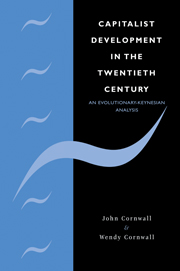13 - A neoliberal future?
Published online by Cambridge University Press: 22 September 2009
Summary
Introduction
In chapter 12 it was suggested that the historical sequence in unemployment rates over the past half-century might be interpreted as a longer-run version of Kalecki's political business cycle. Those who see a pattern of recurring long cycles in the historical record go further and interpret the post-war era as two phases of the most recent long cycle in macroeconomic activity. In this view the recovery of the American economy in the late 1990s marks the early stages of the boom phase of a new long cycle. Although not necessarily based on long cycle notions, similarly optimistic views are shared by those who welcome the spread of neoliberalism as the wave of the future. This regime of reduced government intervention, deregulation and reduction of the welfare state derives its appeal in part from a longstanding belief in capitalism's ability to renew itself, provided that the private sector is relieved of ‘political interference’. Its recent growing appeal and support can also be traced to the greater international economic integration and the argument that increased globalization requires the developed capitalist economies to strengthen existing neoliberal tendencies if they are to survive. The role of government is to assist capital by removing obstacles to the spread of unregulated international markets in a future of increasing globalization.
- Type
- Chapter
- Information
- Capitalist Development in the Twentieth CenturyAn Evolutionary-Keynesian Analysis, pp. 261 - 269Publisher: Cambridge University PressPrint publication year: 2001

